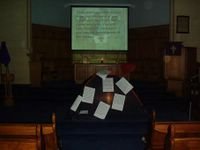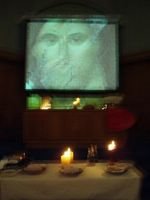
Friday, December 29, 2006
Christmas Day

Saturday, December 23, 2006
As it is in Heaven
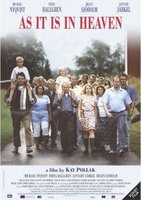 The story is simple. It doesn't have glamourous cast, nor glitz, no complex twists and turns. Rather it has evertything of the everyday, the complexities are in the individuals and their daily lives. It shows the scenic remoteness of the village in Norrland, northern Sweden. You can check out a synopisis elsewhere, but the main character is complex and 'strange' really, but his is a search like all the others amidst a social-cultural context where each is bound up and gagged in a range of ways. Also the past that binds them too. You can at times feel the intensity of it. perhaps that's because it is all too real. The closedness of the small village, the church, the choir. The minister is an interesting and inwardly eaten up guy just like the rest and tortured by his understanding of faith. There are some good lines too as liberation comes for each one of them, though not without pain.
The story is simple. It doesn't have glamourous cast, nor glitz, no complex twists and turns. Rather it has evertything of the everyday, the complexities are in the individuals and their daily lives. It shows the scenic remoteness of the village in Norrland, northern Sweden. You can check out a synopisis elsewhere, but the main character is complex and 'strange' really, but his is a search like all the others amidst a social-cultural context where each is bound up and gagged in a range of ways. Also the past that binds them too. You can at times feel the intensity of it. perhaps that's because it is all too real. The closedness of the small village, the church, the choir. The minister is an interesting and inwardly eaten up guy just like the rest and tortured by his understanding of faith. There are some good lines too as liberation comes for each one of them, though not without pain.Daniel (Michael Nyqvist), a successful and talented conductor, who returns the rural village he grew up in, to recover from a heart attack. No one recognizes him because he had changed his name many years ago. Soon, he is approached to lead the local church choir. As he confronts his own past demons, love comes in the form of one of the choir members, Lena (Frida Hallgren), who helps him to find who he really is. His return though sees him alone in the midst of winter in the village. As he encounters people, he is asked to come lead the choir. He refuses, but is often heard say 'I am here to listen'. I think there is something profound in those words when we go anywahere new and meet new people.
It is its simple story about the beauty of life that makes this film a gem. The music isn't bad either and the scenery all come together and engage your emotions.

I can only agree further with the following comments:
Another thing the audience may have problems with is the simple
characterizations in the film. Everyone has a straightforward role – the
teacher, the artist, the priest, the abuser, the abused, the messiah, the bully;
everything appears so clear-cut and one-dimensional. But, there is so much
honesty in them that their petty differences seem to be a stark reflection of
our own lives.
To top it all off, the film features some truly moving scenes
which will leave you mesmerized with the beauty of music and on a deeper level,
life. Other than the obligatory final inspiring scene, another gorgeous sequence
to look out for is when the abused wife, Gabriella (Helen Sjöholm), sings a song
specially written for her. One of Sweden’s biggest musical stars on stage,
Sjöholm’s voice will enchant the cynic in you.
Sure, there are no loud
explosions and no fancy computer generated effects to draw in the average
movie-goer. But do yourself a favour, watch this film, experience the beauty of
life, and you will take home a piece of heaven with you.
Friday, December 22, 2006
Planting and tending lessons
Closer to home, I decided this year to plant some veggies too. It started something looking like this -
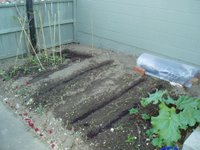
sugar snap peas, sweet corn(!), lettuce, Rocket, beetroot, broccoli, red onions, carrots, parsnip, and butternut squash.
a venerable harvest to share around with friends and neighbours.
In a time of huge ministry change for us all at Highgate, but also myself, the little garden plot has served to remind me of Peterson's 'Under the Unpredictable plant' where he uses a gardening image for ministry.
I confess it has helped me through the past months and weeks since Martin just left a few weeks ago. tending these plants, just enough shelter too as it has even hailed recently, delicately taking out the weeds and watering as required... all the gentle reverence for pastoral care.

So here is a recent update on my patch. See how they grow. It was hard holding back at that crucial stage of simply placing the seeds in the soil. Waiting and waiting and waiting.
With some thinning out some should grow even more, but I hope to harvest some lettuce and rocket for making a fresh salad with plenty taste. Yum!
Thursday, October 05, 2006
Reading the Everyday

Having been reading and thinking and attempting, as last post, to find ways to get us to consider our 'embeddeness' in our locations in mission, I'm grateful to Paul Fromont for this via Maggi Dawn. Its an article in Thirdway Magazine from John Davies. (Though its much more too from his blog here.)
Monday, September 18, 2006
This familiar place?

I came across a way of reading the local context which I adapted for our Annual Meeting purposes.
It is both a visual on the streets around us, buildings, as well as simnply noting which sde of the street people mainly walk on and why? to use of parks and are the seats comfortable, etc, etc. and there's a challenege to name the people who work in the cafes and shops along Highgate. A small challenge really.
Actually what I would love to do, and may yet again, is to get people to walk Highgate with an eye and sense of people movements and much more. It moves us beyond just looking to sensing. I liked that. Then we would display findings and discuss it in considering how we are embedded in this context and what locally could be improved in our environment, etc.
 This is the bear bones of a method derived from the RSVP Cycles (Halpern and Halpern) Sadly, I cannot get my hands on a copy of this and so gleaned from the beb, but if anyone, knows anyone I could borrow from then it would be great to read that book.
This is the bear bones of a method derived from the RSVP Cycles (Halpern and Halpern) Sadly, I cannot get my hands on a copy of this and so gleaned from the beb, but if anyone, knows anyone I could borrow from then it would be great to read that book. Interestingly, people using our facilitires and in the congregation have had curious interest too in the display in the main foyer area. Pre-
 school Music parents/grandparents
school Music parents/grandparents  and others. Mmmm!
and others. Mmmm!I had loads of photos and comments and some fun bits for kids to find MArtin and/or me lying on benches hidden around the display. Also some fun photos from our youth along the way too. Also tried to note some changes to properties and in shop use etc. Lots of options to it really.
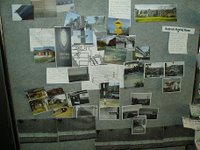



Friday, September 15, 2006
Moving through the silence

And so the blossom has started to burst in Dunedin! Took this today of the tree beside our house.
There is a great deal of change on Highgate just now and we're all in a spin as Martin is heading to Christchurch to a church there.
We have some big questions ahead in the next few months, but we need some thoughtful talk and dare I say it - silence - that helps us. I am reminded of this from Paul Fromont 'Benedict on Silence' which I have been pondering recently. (or from Anthony Hanson here)Given below.
"Silence is a cornerstone of Benedictine life and spiritual development, but the goal of monastic silence is not nontalking. The goal of monastic silence, and monastic speech, is respect for others, a sense of place, a spirit of peace. The rule does not call for absolute silence; it calls for thoughtful talk.... Silence for its own selfish, insulating sake, silence that is passive-aggressive, silence that is insensitive to the present needs of the other is not Benedictine silence.
Benedictine spirituality forms us to listen always for the voice of God. When my own noise is what drowns that word out, the spiritual life becomes a sham. Benedictine spirituality forms us to know our place in the world. When we refuse to give place to others, when we consume all the space of our worlds with our own sounds and our own truths and our own wisdom and our own ideas, there is no room for anyone else's ideas. When a person debates contentiously with anyone, let alone with the teachers and guides of their life, the ego becomes a majority of one and there is no one left from whom to learn. But Benedictine spirituality is a builder of human community. When talk is unrestrained, when gossip becomes the food of the soul, then destruction of others can't be far behind. When talk is loud and boisterous, when we make light of everything, when nothing is spared the raillery of a joke, the seriousness of all of life is at stake and our spirits wither from a lack of beauty and substance. Make no doubt about it, the ability to listen to another, to sit silently in the presence of God, to give sober heed, and to ponder is the nucleus of Benedictine spirituality. It may, in fact, be what is most missing in a century saturated with information but short on Gospel reflection. The Word we seek is speaking in the silence within us. Blocking it out with the static of nonsense day in and day out, relinquishing the spirit of silence, numbs the Benedictine heart in a noise-polluted world."
Joan Chittister, O.S.B., from her book (a translation/paraphrase of the Rule of St. Benedict, with her commentary) The Rule of Benedict: Insight for the Ages.
Friday, August 18, 2006
Readings 3
Andrew walker (Editor) (SPCK 2005)
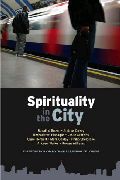
In this as so many areas, the education of the spirit is inseparably bound to highly practical challenges. If - as St Frances de Sales is supposed to have said - spiritual direction begins when people are helped to walk more slowly, talk more slowly and eat more slowly, then the life of the spirit in the city will entail asking about the size of rooms in public buildings, the flow of traffic on the streets, the levels of atmospheric pollution, the maintenance of parks, galleries and libraries, the space available for children in public - and countless other matters where decisions are regularly taken as though none of these could possibly be an issue. (Rowan Williams in Spirituality in the city, p24)
In recent times studies on space and place have seen an integration of the discussion of cities which usually focuses on planning, architecture, and economics, to incorporate the need to address the philosophical, theological, and spiritual aspects of cities. Albeit that this set of essays reflects much upon cities in Britain, this is still a very interesting little volume to read and reflect upon the every expanding city-scapes in New Zealand and the implications for faith. This book was specially commissioned by the London Centre for Spirituality and invites nine writers to help engage us with the nature of ‘spirituality’ and the urban environment of the city.
Each essay provides a different facet to spirituality in the city and offer more than a ‘sentimental’ celebration of the city. Rather, these essays are a serious attempt to understand ‘urban spirituality’ and a politic, if you like, of the built environment where insights of the work of God are discerned or made visible. So Mark Oakley writes of ‘Reclaiming Faith’ exploring the ‘intimations of the sacred –rumours of God’ (7,8) that shape faith in the city. Hence, each notes in their own way the ways in which ‘Urban life,… is at once dangerous and creative…’(R. Williams,17).
I especially appreciated essays from:
Rowan Williams, ‘Urbanisation, the Christian Church and the human Project’. Williams seeks to offer a ‘rough sketch’ of the themes and concerns that might inform an ‘urban spirituality’ with the role of the church needing some careful thought. Reflect upon the challenges he notes the use and organization of time, the question of ‘character’, life lived under the ‘sign of anonymous exchange’.
He tells us that:
We need to rescue spirituality from some of the ways in which it has been domesticated,. …. It becomes only a code for techniques of making people feel a bit better about themselves… where the Spirit makes people ‘uncomfortable about themselves and their environment, critical and creative, open to things being different. (24)
Williams wants a Church to know it has something distinct from the surrounding culture and yet has something distinct to offer society that is more humanizing.
Philip Sheldrake, ‘Cities and Human Community’; considering a theology of place, in particular aiming to hold together urbs (the physical place, buildings, etc) and civitas (people and their life together). HE offers a ‘perspective’ that considers the crisis of place engaging with writers such as Augustine, Sennet, and Augé. In regard to De Certeau he takes up the practice of the city and ‘resistance’ to systems that leave no room for otherness. In conclusion he notes some spiritual issues especially the city as a place of reconciliation.
Bernadette Flanagan, ‘Urban Spirituality, One size does not fit all’, provides an excellent overview of six models of contextual spirituality, based upon Stephen Bevans snapshots of the ways Christians go about exploring the presence of God in different contexts they find themselves in. Flanagan provides helpful insights to each model with examples. This is a very concise, yet provocative essay with wide theological and social awareness beyond ‘new ways of being church’.
Andrew Davey, ‘The Spirituality of everyday life’. HE asks what is so different about prayer/spirituality in the city? How does the urban context affect the way we pray; and vice versa? What strategies and practices might we adopt?
Davey notes ways in which our ‘Location is vital. The places where we live, work, worship and encounter others are an essential part of the formation of our spirituality and theology.’(106)While the context(s) may not be very conducive to spirituality he does admit that ‘Cities are places of possibility and encounter’ (108) in which congregations can create spaces.
Andrew Walker, ‘Urban Possibilities for daydreaming’. Seeks to take the prayer of Examen and explore the dynamics of this as a suitable and apt form of prayer to the demands and pressures of urban life. This essay is well worth consideration as it is easily applicable to adapt to any urban context and its challenge for reading the cityscape environment, but in relationship to God.
There are some repeated themes throughout and some essays will strike you more than others. While each writer is aware of the dangerous, more negative side of the city, on the whole each is hopeful of the city. I wonder about the marginal voices and what they might say about spirituality in the city and whether they might take us to other depths not greatly expressed in this work. Furthermore, this volume may have benefited from an attempt to draw out the common themes, and identify the agenda more clearly as a way to indicate ways forward. However, this is a worthy collection.
Wednesday, August 16, 2006
Readings 2
Stuart Murray (Paternoster 2004)

In this book Murray continues his helpful analysis of post-Christendom churches. Part 1 explores issues of ‘Shape’ taking Acts 11 v1-18 as a paradigm to consider the shifts from Christendom to Post-Christendom. The key question is How might the church emerge or evolve? Murray teases out the issues of belonging, believing and behaving after Christendom and the complexities of this. I especially found helpful the clarity of his analysis and critique of the notions of centred, bounded and fuzzy set models of how we understand church. In particular, he considers the degrees of alienation and the language we make use of here, e.g. Semi-churched, de-churched etc. Rightly, I think, perhaps because I personally have issues about such language, he states,
‘This language is problematic, not least in its omission of any reference to other faith communities and its Christendom-orientated assumption that ‘churched’ is the cultural norm, rather than a counter-cultural experience. And it categorises attitudes towards church rather than Christian faith.’(25/6)
There is a chapter that critiques matters of leavers and joiners, which picks up on the works of James Fowler, Alan Jamieson and others. Murray then explores matters of church emerging or evolving. In some ways this is irresolvable at present, but I did like the probing, questing and the search for wisdom that we might learn from both inherited and emergent church.
Part 2 takes Ephesians 4 as biblical paradigm and Murray wants to ask the question What kind of church can survive and flourish in post-Christendom? The chapters that follow explore mission, community and worship. Within each, Murray takes terms and phrases that have become common use language in today’s church scene eg. Maintenance to mission, institution to movements, etc.. Across these chapters he considers evangelism, church discipline, leadership, rhythms and resources. He concludes,
Post-Christendom is a new environment…Ephesians 4 envisages a church united in hope(v4) confident in its destiny (v13) and getting on with the simple day-to-day business of speaking the truth in love (v15) and doing works of service (v12). If the church does survive the demise of Christendom, it will surely be a church sustained by simplicity and hope. (231 italics mine)
I say yes to that. I reckon that this second book (to what is now a series) is an invaluable that should help us frame our questions better in the new environment we find ourselves in. I appreciated the deep challenge, yet the refreshing ways that Murray provides open, honest analysis and critique. I found I couldn’t put this book down. It is a book I will probably need to keep returning to.
Readings 1
Post-Christendom Church and Mission in a strange new world.
Stuart Murray (Paternoster 2004)

In this book Stuart Murray seeks to move the discussion out of post-modernity/ism and to explore the other term that has become part of our vocabulary in recent times ‘Post- Christendom’. Murray offers an interesting perspective and seeks to make a case for ways the Church should respond to its changing status in society. He highlights key moments that were significant cultural and theological shifts that impacted the church’s mission for centuries. There is actually a necessary, though lengthy, historical introduction which helps set the context for his discussion. In the whistle-stop historical tour we move from the coming and expansion of Christendom where Augustine is figured as the significant figure in the Christendom shift, to the disintegration of Christendom, where Murray is particularly looking at the Reformation. In his reading of the reformers he states that ‘they introduced important changes but did not challenge the Christendom mindset’. Hence, as Murray points out; oaths, infant baptism, tithing, just war, use of Scripture to support the dominant culture, Old Testament taking precedence over the New, the marginalizing of Jesus, a ‘clergy caste’ who ‘performed services’ and an increased ‘dominance of monologue preaching’ and the operating with a ‘hermeneutic of order’ rather than justice, concern with church discipline, all reflect how the Reformers ‘hoped to transform society from the centre, but challenged none of the essential components of Christendom.’
It is perhaps at this juncture Murray’s Anabaptist perspective radically prods at those of us who are of a reformed tradition or background. Nonetheless, the book highlights how inaction, denial or hope in out-moded revivals are simply no longer options and calls for the church to accept that radical change is needed in all areas of mission and ministry. Indeed, it shows how a new mindset is required for actually 'being' church.
The legacy of Christendom in the vestiges and mindset that persist – ecclesial and social, Murray outlines some responses that we need to move beyond – denying, defending, dismissing, dissociating, demonizing, disavowing, disentangling, deconstructing, disembarking.
For all Christians concerned with the present and very real issues, Post-Christendom is an informative, hopeful and important account. However, its historical introduction, whilst necessary for setting the book in context, is overly critical and lengthy, and the book as a whole does perhaps betray a particular historical reading. Nevertheless, this does not undo the worthiness of this book.
The final chapter as he acknowledges, is not so much about resource answers, as matters of keeping on questioning. In conclusion, it rests upon a fresh encounter with Jesus at the margins of church and society, ‘since that is where Jesus is so often found’.
The helpful thing as you read through this book is that Murray persists with rigorous questioning that I think is vital to connect our inherited past (Christendom) with the present we encounter. This book challenged me and the questions raised should continue to engage us in our own context here in New Zealand, where perhaps some of these questions are more pointedly being faced. The post-Christendom of New Zealand is an interesting anomaly that has some huge deep running tensions within and among the churches. Also, post-christendom here has much to recover from, in a way, due to a very colonial christendom and how things have developed historically. This is too simplistic and otehrs will know much better, but...we need to do a similar reading for here(Unless osmeone can guide me to a source I am not aware of ).
Tuesday, June 27, 2006
His Mission
His mission. It is of the greatest importance to recognize that it remains his mission. One of the dangers of emphasizing the concept of mission as mandate given to the Church is that it tempts us to do what we are always tempted to do, namely to see the work of mission as a good work and to seek to justify ourselves by our works. On this view it is we who must save the unbelievers from perishing. The emphasis of the New Testament, it seems to me, is otherwise...
The church is not so much the agent of the mission as the locus of the mission.
(pp117,119, The Gospel in a Pluralist Society. Lesslie Newbigin)
Saturday, June 10, 2006
Fake or what?
 IS mission our absolute priority? are we to wrestle with relevance, ruthlessly striving for competence and credibility in the marketplace?
IS mission our absolute priority? are we to wrestle with relevance, ruthlessly striving for competence and credibility in the marketplace?I find myself more and more frustrated that the passion for mission is driving us further and further away from Christ.
Is it just me or is worship not our priority absolute ? Is 'relevance' or 'credibility' the issue, how about being plausible and real ? i'm not sure about ruthless(?) buit our striving shouldn't it be after the things of Christ and obedience to participation in the life of God, Fatehr, son and Holy Spirit, out of which flows and moves the very Christ-like life we are called to ?
Then I come upon this from a series by BBC called the Monastery. ( more at Paul Fromont)
"I’ve been to a few churches around town and they just annoy
the **** out of me because they’re so fake, and the people look so lost, and the
people on the stage just look so plastic and so charming and so seductive, and I
just think ‘I don’t believe in these people’. These people are not an expression
of faith. So, I’d much rather just slip into a church and sit there for 10
minutes and have a bit of quiet time, or pray at home. I don’t feel that you
necessarily have to turn up at a certain place at a certain time dressed in a
certain way to express your faith and live out your faith. I think there’s other
ways of doing it." (Tony Burke).
Paul then says:
little when we have so much, when we are who we are in Christ, because of
God’s wonderful grace and love?
I have been reflecting on Paul’s letter to the Roman church(s) over
the last few days. It’s glorious and the call of the church to be the faithful
people of God, new humanity in Christ, is simply breathtaking. Against that
backdrop it’s a sad indictment when words like “fake,” “plastic,” “lost,” and
more besides, can be attributed to the body of Christ.
Given our recent Pentecost journeying and reflections (previous posts) I wholeheartedly agree! Somehow I think we are kidding ourselves, we need to get under the surface issues and wrestle with the harder issues beneath. Maybe though, that is too much for us to face as we already know its easier to point the finger at society and critique the church and challenge and barrate about mission relevance, when the very heart and core of our faith is what needs addressing; dare I suggest that in this way we will stop simulating church and exercise the faith the Gospels call us to live.(see Pentecost 7).
Monday, June 05, 2006
Love shaped living
41 Let your love, God, shape my
life with salvation, exactly as you promised; 42 Then I'll be able
to stand up to mockery because I trusted your Word.
43 Don't ever deprive me of truth, not ever - your commandments are what I depend on. 44 Oh, I'll guard with my life what you've revealed to me, guard it now,
guard it ever;
45 And I'll stride freely through wide open spaces as I look for your truth and your wisdom; 46 Then I'll tell the world what I find, speak out boldly in public, unembarrassed. 47 I cherish your commandments - oh, how I love them! - 48 relishing every fragment of your counsel. 49 Remember what
you said to me, your servant - I hang on to these words for dear life!
I came across Gracian. Some things never change. I found these words on the Art of Living well which is what i believe we are called to. The temptation after Pentecost is perhaps be encouraged that the Spirit is at work still in Christ's Church and so we set about getting busy in order to prosper and grow the church. I think not.
Baltasar Gracian was a Spanish Jesuit. (1601-1658) a philosopher and writer, scholar and satirist, he frequently expressed himself in epigrams. A Jesuit priest he was counselor to kings. He made a careful study of the powerful and elite. His work spoke wisdom, like Solomon's, into the then chaos of the world and perhaps they still have relevance. Needless to say his writings were later confiscated and banned by the Church.
the fool, and the dissolute. The one because he does not know how to preserve
it, and the other because he does not know its value. As virtue is its own
reward; so is vice its own punishment: for he who lives too fast is quickly
through, and in a double sense: while he who rests in virture, never dies. For
the life of the spirit becomes the life of the body, and the life lived well
gathers unto itself not only fullness of days, but even length.
Gracian’s Manual, § 90 (see here)
Sunday, June 04, 2006
Pentecost... What is going on here?
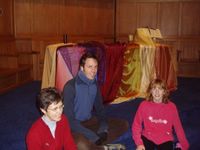
Today was the culmination of Waiting on Pentecost for us. At our Roslyn worship hub we had a beautifully covered table with swaiths of colourful cloths. The whole service was put in a series of envelopes and people simply had to select this and we did whatever it said. It was a wonderful time as people selected and came in excitement to see what would be done next. We had people play music and read and pray. We had a new song from Brazil with a great rhythm! Participation at all levels and what was happening next hightened our sense of Pentecost. Colourful streamers and pingpong balls with attached streamers to throw at the very end of the praise songs and praise shout!
I preached from under a colourful umbrella a reminder of the puring out of the spirit and life now lived as Christians and as a Church under the umbrella of the Spirit. However, it doesn't work inside where we are safe warm, etc. it is about being sent out! Should have had an umbrella for everyone to go with, especially since it was pretty wet out today.
We had our gathering lunch to follow. Conversation covered several things, but most of all we were concerned with ways in which we as a church lived and moved and witnessed in the public spaces of the communities we are part of. All part of our overcoming of how we perceive gospel and culture's interaction. Only as we live as if it were threat do we build barriers and walls. Yet our sentness as a church means travelling light under the umbrella of the Spirit over us and in us. This will be an ongoing thing for us to now build upon. What IS going on here?
Paul Fromont I see has written this (below) and it struck me as relevant to us here.
I found myself asking, time and time again: “what is gospel,
what is good news in these contexts?” “What would it look, feel, sound, taste,
and smell like to embody gospel in these contexts?” And, “where was the Spirit
at work; where are there hints of gospel?”
The other big questions to reflect on is: “what is it that alienates, isolates, and victimises us in relation to each other; what is the place of the “powers” in this process?” And, “Who is my neighbour, and how do I love my neighbour as myself?”
Henri Nouwen writes:
“…Beneath all the great accomplishments of our time there is
a deep current of despair. While efficiency and control are the great
aspirations of our society, the loneliness, isolation, lack of friendship and
intimacy, broken relationships, boredom, feelings of emptiness and depression,
and a deep sense of uselessness fills the hearts of millions of people in our
success-orientated world… And the cry that [so often] arises from [the
hollow and empty places of our lives] is clearly: ‘Is there anybody who loves
me? Is there anybody who really cares?...Is there anybody who wants to be with
me when I am not in control, when I feel like crying? Is there anybody who can
hold me and give me a sense of belonging?’ From In the Name of Jesus: Reflections on Christian Leadership (pp. 33-34)
Saturday, June 03, 2006
Waiting on Pentecost...10
Insider-outsider language prevails so much in many spheres. Within the church such language is surely inadequate it leads to terms such as OUT-reach being used without much thought for the image this conveys. Yet read passages such as this Ephesians text and there is an intensity about the ways in whch the cross breaks barriers and joins us together and gets us to embrace; outsiders are no ooinger outsiders and in a sense insiders no longer insiders.
Organisational theory uses the term autopoiesis to convey an understanding that the environment is to be seen as a part of the system because it is an essential part of the interactions. That is, easch element simultaneously combines the maintenance of itself with that of the others.
Its a bit like seeing a tree in an orchard and recognising that the weather, the soil and the wider orchard all play a part in its growth. They are part of the system to be considered. The tree adjusts and grows accordingly. hence the inner rings will be larger or smaller for instance due to the season it has had.
To begin thinking in such a way forces us to address barriers and a radical change to our thinking and behaviour. What if we were to allow Christ to shape our identity as God's people not determined by social, cultural divisions, but to be a glimpse of and experience of embrace.
What are we so afraid of in the world, societies and cultures we are part of in the environment?
Friday, June 02, 2006
Waiting on Pentecost...9
When you see a job needing done what do you do?
What does servanthood mean for us in truly practical terms?
Paul challenges us today not simply to do what is 'convenient for us.', it isn't about our status and little power plays. Move beyond such things We are rather called upon to look after the good of all those aorund us, asking ourselves " How can I help?'
Seems to me that is the nub and rubbing question we need to keep asking ourselves daily.
In the midst of a society where people tends to express and act according to what is good for me and stuff you sort of ways, I wonder what we might begin to look like and witness to. As Paul also says here "Just think of all the scriptures that will come true in what we do!'
Such service is like the overflowing and brimming over of the hope of Christ within us.
So when we see a need, will we lend a hand? looking after the good of those around us.
Waiting on Pentecost...8
Become what you believe was our heading for the day.This, I confess, is a key text that has shaped my missionary calling and one to which I constantly return. It concerns sending out.... no big fund raising..."you don't need a lot of equipment. You are the equipment, all you need to keep you going is three meals a day. Travel light.'
These are words that run deep for me, but the more I consider the church in mission, I long for us to travel light, to realise that beyond all else, it is people who are the equipment.
Last night the girls and I went to hear Julian Lloyd-Webber play cello at the Town Hall as part of his NZ concerts with the NZSO. We had great seats and it was a wonderful experience. As I listened, but also as I observed him play, he had no music score, but cliche as it is, he was so much at one with the instrument and lost in that musical zone with the whole orchestra as it played. It was his attention to the instrument, equipment- the little glances up at the conductor, over and around the orchestra as they played together. There appeared such a simplicity, though it was far from it. And of course the years of practice and just sheer giftedness made it an amazing experience to hear him play live. I believe that there was an attentiveness among other things here that teach us something of our part in the church as equipment, each with our particular gifts as part of the whole body and making our unique contribution.
Still travelling light....
Thursday, June 01, 2006
Waiting on Pentecost ...7
Tonight at Caim we had a Pentecost gathering. We heard the text and people were invited in quiet time to come write up what God may be saying to us on a board(they could write a word, phrase or draw)

We concluded with an act of placing ourselves before God. If they wished to come forward and kneel. A prayer was said over each and others could join in laying on hands.
‘As you place yourself before God now,
God to enfold you,
Christ to touch you,
the Spirit to surround you this night and always. Amen.’
There was a waiting around last night that was unrushed.
some comments:
‘Changed from the inside out’;
‘do not be afraid’ ;
‘let go… God will catch you’
‘forgive’
‘see things from another point of view’
‘Bless your enemies and then the sandpaper helping to make things smoother’
‘Lover to the poor, lover to the lost,
Lover to the down hearted
Do these things by the strength, direction, love and ability of your Father.’
Wednesday, May 31, 2006
Waiting on Pentecost...6
Some stuff we need to know basically. 'Concerning spiritual gifts...' They needed some help to understand the 'body' of Christ and how it worked.
 Body building was the image that came to mind on reading this text. But actually, that soesn't completely help, because I recall visiting a gym years back and all you saw were those huge mirrors and people looking at themselves as they flexed their muscles on the weights.
Body building was the image that came to mind on reading this text. But actually, that soesn't completely help, because I recall visiting a gym years back and all you saw were those huge mirrors and people looking at themselves as they flexed their muscles on the weights.Rather, I think Paul may prefer some exercise that isn't so self-centred. I also think that the nature and purpose of spiritual gifts for the building up of the body is intended in such a way that there are deeper matters such as respecting each other simply because we are 'members of the same body', not because of our particular gifts. Sometimes we are in danger of cur=bing otrhers gifts because we have such a body-building image that is so focussed upon the 'ME' alone sort of stuff, whereas my gifts are only any use when placed alongside others as a whole. When the body of the church exercises in this way the body is built up and made more and more complete as there is space and room and need for other parts still to be added.
1 Corinthians 12:
Each person is given something to do that shows who God is: Everyone gets in on it, everyone benefits. All kinds of things are handed out by the Spirit, and to all kinds of people! The variety is wonderful:
wise counsel
clear understanding
simple trust
healing the sick
miraculous acts
proclamation
distinguishing between spirits
tongues
interpretation of tongues.
All these gifts have a common origin, but are handed out one by one by the one Spirit of God. He decides who gets what, and when.
12-13You can easily enough see how this kind of thing works by looking no further than your own body. Your body has many parts—limbs, organs, cells—but no matter how many parts you can name, you're still one body. It's exactly the same with Christ. By means of his one Spirit, we all said good-bye to our partial and piecemeal lives. We each used to independently call our own shots, but then we entered into a large and integrated life in which he has the final say in everything. (This is what we proclaimed in word and action when we were baptized.) Each of us is now a part of his resurrection body, refreshed and sustained at one fountain—his Spirit—where we all come to drink. The old labels we once used to identify ourselves—labels like Jew or Greek, slave or free—are no longer useful. We need something larger, more comprehensive.
Tuesday, May 30, 2006
Waiting on Pentecost...5
You are God's HOUSE
Just because you're in the kitchen and I'm in the hall doesn't mean we are not at the same party.
(from Small ritual)
Quality foundations are important. But these are the sort of things that take time and involve patience and a standing back at times, as much as participating in just the right ways too. Paul in this text uses a couple of images one being farming and the other building. are we content in our role in the house on the farm? What if I do all the land tilling and another sowing and then someone else comes along and waters it and gets all the benefits and glory of the growth and fruit? Similarly, digging foundations, hard labour... someone else builds on it. In my own expereince I recall several of us in church plants being asked a question to take away and ponder - what oif you were to be called away tomorrow to another place; could you leave? Initially there were plenty reasons for saying No way! so much to do... but then a dawning. I learnt to be content in what I was called to do and do that well, to my utmost... walk away then ? Well yes and content while hpeful that the sower and waterer would do their part well too.
Some other thoughts though reminded me of Small Ritual where there's some interesting stuff that will stimulate in this way more. check it out. The Nolli Plan for one.
Monday, May 29, 2006
Waiting on Pentecost...4
Today Sunday we met for a gathering time. Over some lunch we chatted informally about the texts we had read and reflected upon so far. Nothing clever, but actually some rich depth of insights were shared. But what was also striking was the chance for people to grow closer and get to know one another better. It was encouraging to hear this expressed too.
I was especially struck by 2 stories. One of a hippie group of young people who came along to a church folks had previously been part of. Half naked they came week after week. Nop one in the church saiud anything nor reacted in shock, until one day the same folks all arrived wearing ties etc. they had been testing the church out and in time many came to key leadership positions and more. They played a part in the building up of that body in all its varied diverse parts. wonderful! What a challenge? I wonder how we would measure up?
I also was struck by another sharing of how they see thoose Christians who have impressed them, they admire and who have had some imprint on thier faith, would be those who have a gentle wisdom and manner. Added to this another spoke in terms of people who made or had 'room' in their lives for others out of the roominess they themselves know abiding in God as Father, Son and Holy Spirit. They were speaking in ways of what it is then to live the life and learn widom from God.
So we broke bread and shared such things, we heard personal stories too and there was an encouraging of each other that was so simple. We then prayed for Highgate Mission and wider.
next Gathering time will be at Wednesday nights Caim.
Waiting on pentecost 3...
Once on the ‘firm spiritual ground’ (seems to relate to our earlier reading reflections too) Paul speaks of wisdom
will be out-of-date in a year or so. God's wisdom is something mysterious that
goes deep into the interior of his purposes. You don't find it lying around on
the surface. It's not the latest message, but more like the oldest—what God
determined as the way to bring out his best in us, long before we ever arrived
on the scene. The experts of our day haven't a clue about what this eternal plan
is. If they had, they wouldn't have killed the Master of the God-designed life
on a cross. (The Message)
Strikes me that we, and as the Church, are all too often in the last decade or so turned on by the sort of wisdom that is fashionable, popularist, trendy and high priced. Such simulated faith though is all surface while he points and directs us to a Godly wisdom that is none of these, it is ‘Old’ and ‘goes deep into the interior of his purposes’. Now that is really something! Taught us in a personal way through Jesus Christ. Seems to me that we need to spend more time in such relationship and lessons than in seeking to be too clever or smart in our own terms with ‘fancy mental and emotional footwork’. In step with the Spirit we learn so much deeper things – this is wisdom –ears to hear and eyes to see and a knowing therefore what to do. The mind of Christ in us!
The way to this is by learning to indwell scripture, taking time daily to place ourselves there and wait so that in turn we live it out. Our wisdom will excite us, but...how far will it get us. Recently I have been reading Hans Urs von Balthasar and related books. Balthasar notes that often a Christian's whole life can be seen as living out just one verse of scripture. This can be vital to our calling/vocation as we revisit the text again and again and keep finding new dimensions to it. In this way we inhabit the text and it us.
What texts have shaped or are shaping you ? (providing that firm spiritual ground for missionary calling.)
You might like to visit Steve Taylor (Wednesday 25th May) who is asking -
What are the Scriptures that have shaped your emerging mission? What are the texts that have "read" you and formed who you are becoming in this postmodern culture ?
Saturday, May 27, 2006
Waiting on Pentecost... 2
This puzzle has claims to be the best of the genre. It is simple in its statement, absolutely baffling and yet with a completely satisfying solution. Most people struggle very hard to solve this one yet they like the answer when they hear it or have the satisfaction of figuring it out.
It is a simple puzzle to state but a difficult one to solve. It is a perfect example of a seemingly irrational and incongruous situation having a simple and complete explanation. [from -mycoted]
I think so many things can be this way in life- left staring up at the sky too often and consumed about the wrong things, asking the wrong questions. Take yourself to the space/place of waiting and receive in order to share the good news to the ends of the earth. The answer again is so simple!
Day 2. Galatians 5:13-26
The film “Shall we dance” with Richard Gere and J-Lo sees a middle aged man drawn to a dance class with others as beginners. Dancing with the Stars too has highlighted a renewed dance craze. It isn’t easy to begin to learn the steps, to be ‘led’ in time to the rhythm of the music. There seems to much to co-ordinate with your body. In the film J-Lo takes Gere and shows something of the freedoms within the constraints of the steps and the music to give expression to that freedom and the deeper ‘passion’ evoked in the rhythms/beats. Gradually he and the other ‘2-left footers’ truly learn to dance. It becomes something from deep in their soul.
Strikes me that to be free as a Christian, to be empowered in life in the Spirit to live and walk and keep in step with the Spirit, then there are some ‘dance’ lessons I need to learn the steps to begin with (The Greek for 'walk' used here concerns ‘keeping in line, in tune, in step with), but then it goes deeper, there is a fruitfulness – love, joy, peace, patience, kindness, goodness, faithfulness, gentleness, self-control. All of these are of the essence of the Christ-like life in us and expression of faith in every Christian.
“If we live by the Spirit, let us also walk by the Spirit”
Friday, May 26, 2006
Waiting on Pentecost...1
We look at this Son and see God's original purpose in everything created. For everything, absolutely everything, above and below, visible and invisible, rank after rank after rank of angels—everything got started in him and finds its purpose in him. He was there before any of it came into existence and holds it all together right up to this moment. And when it comes to the church, he organizes and holds it together, like a head does a body.
18-20He was supreme in the beginning and—leading the resurrection parade—he is supreme in the end. From beginning to end he's there, towering far above everything, everyone. So spacious is he, so roomy, that everything of God finds its proper place in him without crowding. Not only that, but all the broken and dislocated pieces of the universe—people and things, animals and atoms—get properly fixed and fit together in vibrant harmonies, all because of his death, his blood that poured down from the cross.
21-23You yourselves are a case study of what he does. At one time you all had your backs turned to God, thinking rebellious thoughts of him, giving him trouble every chance you got. But now, by giving himself completely at the Cross, actually dying for you, Christ brought you over to God's side and put your lives together, whole and holy in his presence. You don't walk away from a gift like that! You stay grounded and steady in that bond of trust, constantly tuned in to the Message, careful not to be distracted or diverted. There is no other Message—just this one. Every creature under heaven gets this same Message. I, Paul, am a messenger of this Message.(Message Trans)20 Since you died with Christ to the basic principles of this
world, why, as though you still belonged to it, do you submit to its rules:
21"Do not handle! Do not taste! Do not touch!"? ... 1Since, then, you have been raised with Christ, set your hearts on things above, where Christ is seated at the right hand of God. 2Set your minds on things above, not on earthly things. 3For you died, and your life is now hidden with Christ in God. 4When Christ, who is your life, appears, then you also will appear with him in glory. (NIV)
Monday, May 15, 2006
Stretching the envelope... out of our comfort zone
Acts 8 was the text today (esp. v26-40). The early church lived in the tension of still following some Judaic practices and still living very much in that space. Yet its encounters with gentiles and other strata of society with the Gospel took it out of its comfort zone and placed them in places that they might not otherwise certainly have been in. The envelope was stretched for them; don’t just stop at the Samaritans(half casts with their own temple, but go to the ends of the earth, at the time Ethiopia (Kush the upper Nile areas), and so an out right alien. Furthermore, a eunuch, some one distasteful and representative of a group. For Philip like others this was all less than comfortable and not something they might previously have considered.
He told us also of John Wesley, reading some of his journal on being called to street preaching, taking him well beyond his comfort zone, and stretching the envelope in amazing ways that the gospel reached the poor and raised people who would follow.
We heard too though of how Wesley was never happy nor content on street preaching, but he did it all the same.
Brett repeated often the phrases that still ring for us of ways in which God’s Spirit today may be stretching our envelope and moving us out of our comfort zone(s). Perhaps there are things, people, places we are being called to beyond our comfort zone, that stretch the envelope and yet have significant and unknowable results well beyond us.
I think there is something of this for the church today, it certainly sounds a chord with us on Highgate where the envelope has and is stretched. There is something of such tension that I think is necessarily a sign of the missionary congregation.
So where are we placed?
Take your body and place yourself on the street, take yourself among others in pubs, clubs, hospital, shelters, jails.... go beyond the safety of 'church' . We live and move daily in the public sphere. Our spiritual ;ife is as much shaped by where we place our bodies: "present your bodioes as living sacrifices, holy and acceptable to God, which is your spiritual worship."
Hans Frei , a theologian wrote
“… the embodiment of the Easter story’s pattern in our lives means… a new way of governing our bodies. That is how we are in touch with the story.”
(The Identity of Christ p171)
Tuesday, May 09, 2006
Public mission through public art
Opawa Baptist Church, Peter and Joyce Majendie are presenting a one day seminar entitled, "From Inspiration to Installation: Public mission through public art."
Peter and Joyce will share their knowledge gleaned from years of practical experience, including;
1. moving from ideas to creativity to implementation
2. art, creativity and mission
3. using public spaces
4. mobilising volunteers
5. working with media groups
This seminar is part of a Pentecost weekend experience that will include art, creativity and spirituality seminars, cafe and live music.
For more go to Steve Taylor
Thursday, May 04, 2006
The Message in a public sphere
It caused us to consider persecution for faith beyond us as well as the message in the public sphere. In the face of persecution in Jerusalem they scattered and became missionaries. Philip’s mission taking the Gospel to Samaria and ‘joy’ coming to the city in the face of oppression was the other part of this.. The challenge to us was, as Brueggemann puts it
“The gospel is too readily heard and taken for granted as though it contained no
unsettling news and no unwelcome threat. What began as news in the gospel is
easily assumed, slotted, and conveniently dismissed.” (Finally Comes the
Poet: Daring speech for proclamation, 1989).
So taking it on from there I have been pushed to consider further ways in which we dress up the good news in ways that actually cover it up. Do we actually love the trappings more than the gospel itself? Do we believe any more that the gospel is plausible? Where is the daring speech in the face of whatever it is that hounds us today as the church? What is our reticence with all of this?
I’m not saying we need to go to the public square and shout at people, but how do we share the message in ways that ‘joy may come to the city we are in as response to the gospel proclamation?
I also had a piece to write recently on 'Creating a culture attractive to non-church people.' Needless to say I didn’t like that whole phrase in many respects so opted rather to turn it into cultivating the congregation as a hermeneutic of the gospel. My point being that we should be in the patient and humble, but no less demanding work of ‘cultivating’ and seeking a depth of plausibility in faith rather than mere relevance which seems to me to be breeding more and more simulated experiences of gospel and is façade at its cheapest and weakest. Jason Clark has some interesting things on this that has stimulated response too. worth a look at especially his recent on cultural neutering: which echos my own thinking somewhat and I look forward to what he will go on and say.
Yet in trying to avoid the neutering process we can actually perpetuate it. We
may create a new emerging church subculture that is as culturally neutering for
modern church people and postmodern people outside the church. Relevance is
important, but in many cases it is can be largely superficial and focused on
re-branding and marketing, however unintentional. Without an examination of the
things we believe, and our message, the church becomes obsessed with the
acceptable and trendy, and can become more self-focused and irrelevant.(Jason Clark)
We offered prayers first picking up a nail(s) and placing them on the table a symbol of our prayers for oppressed, those who suffer injustice etc. and then there were some scattered small coloured squares all over the floor. People also were invited to come pick up as many as they wished of whatever colour and before they left to place these on the table as a symbol of our prayers for the church in the world in all its colourful parts. These interactive prayers for others coming from our text caused a waiting around the table (yet again).
and so we went out into the night and I look at Pentecost and consider more and more how we might make some public display on that day at least. Any ideas? Our theme that day will be
Friday, April 14, 2006
Towards Easter…
Monday An act of Love
Reading for the day John 12:1-8
We came to a table where Jesus was to be thanked over a meal with friends who had been overwhelmed by Lazarus resurrected from the dead. Awesome! We reflected on the responses at the table to this, to Jesus especially on Mary’s audacious, precious act of love towards Jesus in contrast to Judas’ politically correct piety. (so to speak). Sometimes in church we come up with such replies to acts of passionate loving in response to Jesus. And so we miss the blessing.
Invitation was made to take some oil and sign the Cross on our hand.
Tuesday At Home.
Reading for the day Mark 11 v15-19:
A sudden jolt with Jesus in the Temple.
Does it surprise us? Does it shock us?
It asks questions about ‘home’ for us.
We contrasted something of all the Temple stood for and became, we refelcted upon the desire of God to’dwell’ with his people Tabernacle - people in exile, on the move, tent (somewhat borrowed from Maggi Dawn in recent blog) A turangawaewae… a ”Bield"( is an old Scottish word rich in meaning.)
It may describe a physical place of shelter and refuge, a pleasant environment of protection and rest.
It can also express such activities as: 'to nurture' and 'succour','to embolden' and 'encourage'.Each of these meanings suggests a facet of life at ’home’ in God’s place, a place of intimate prayerful worship.
We sang: Psalm 91
Whoever lives beside the Lord
Sheltering in your mighty shade;
Shall say ‘My God in you I trust,
my safety, my defender.‘
From unseen danger and disease,
God will keep you safe and sure.
Beneath these wings
a place you’ll find
a refuge from all danger.
You will not dread what darkness brings,
hidden danger, deadly plague.
Nor will you fear in daylight hours
the evil that surrounds you.
A thousand may die at your side.
Thousands more fall close at hand.
But with his truth for Strength and shield,
no threat will ever touch you.
God says ‘I’ll save from every harm,
those who know and love my name.
In trouble I will honour them
and show them my salvation.’
Wednesday They looked at one another
Reading for the day John 13 v21-32
Reactions to Jesus’ love vary; pushed away, rejected,
not understood or accepted or entered into.
Some strange things said at table about ‘betrayal’ and the disciples look around at one another in uncertainty, wondering and
increasingly insecure. We considered the looking around that night, the emotions that would have charged the air at that Table
Amidst the looks around at one another,
There is another look too— from Jesus. We looked into this icon The Peacemaker; the face required time of us, indeed the look stopped us in our tracks and caused us to consider the looks of Jesus as he washed their feet, as they ate, later even as Peter denied Jesus and looked. These are knowing eyes that look deep into us rebuking, yet without malice; piercing so as to forgive. This face looks at us fully from the human pain and frailty, brokenness, shattered hopes, yet it is the face of God to us also and so it lifts us into peace.
The Peacemaker, Andrei Rublev.
Thursday Together at the Table.
Reading for the day John 17
We gather at the Table remembering Jesus invitation to share in this bread and cup. We come to be bound together in unity in Christ and to witness to the hope set before us in anticipation that Christ shall come again and the banquet will be fully spread and shared.



Reflections on our relationship with God that should affect our relationship with one another in the church – oneness. We took time at the Table tonight, not a fast-food meal or rushed, but time together. We heard words from Athenagoras of Constantinople ‘
I have waged war against myself for many years. It was terrible. But now I am
disarmed. I am no longer frightened of anything because love banishes fear. I am
disarmed of the need to be right and to justify myself by disqualifying others.
I am no longer on the defensive, holding onto my riches. I just want to welcome
and to share. I don’t hold on to my ideas and projects. If someone shows me
something better – no, I shouldn’t say better but good – I accept them without
any regrets. I no longer seek to compare. What is good, true, and real is always
for me the best.
That is why I have no fear. When we are disarmed and
dispossessed of self, if we open our hearts to the God-Man who makes all things
new, then He takes away past hurts and reveals a new world where everything is
possible.’
And so we came as One to the table laying aside and entering into healing, restoration, reconciliation. But we also were aware of the words of John Chrysostom who spoke of 2 altars, that in the Church and that in the public space (the one we can ignore – the poor, the suffering, those in need, the homeless and all in distress).
He said ‘
Do you wish to honour the body of the Saviour? Do not despise it when it is
naked. Do not honour it in the church with silk vestments while outside it is
naked and numb with cold. He who said, “This is my body”, and made it so by his
word, is the same who said, “You saw me hungry and you gave me no food. As you
did it not to the least of these, you did not do it to me.” Honour him then by
sharing your property with the poor, for what God needs is not the Golden
chalice, but golden souls.’
At this Table we are brought into unity with Christ as we partake, but in doing so we are also brought into union with each other in the community of faith and beyond.
And so…. The people came and sat around the table on benches, on the steps, dipping the bread and sharing with friend, family. Together we sat at table and joined the feast. THEN… into this came someone unexpected angry… the guide leader, irrate at waiting to get their car stuck in the car park. Someone headed to deal with that and returned and so some went to move cars… it was a curious thing and a reminder to us too perhaps that the world awaits… but we sang ‘Night has fallen’, shared a blessing and people just sat around and began to move and greet one another and gradually we all drifted to our homes.
Good Friday Invitation to keep company in His sufferings
Reading for the day JOHN 18 v1-19
Arrest, peter’s denial Jesus ‘I AM he’ contrast with Peter’s (ours) ‘I am not…’ and so we come to the Cross.
The awesome silence of this image to reflect upon; the whole world seeming to have come to a standstill, yet the Cross now becomes its turning point. Here we see a restrained expression of grief, Mary stands in dignified lament; her hand to her lip as she stands, but the spiritual strain and anguish of the event is accented in her fragile figure. Opposite is John, the beloved disciple’. He too mourns, clasping a tearful face, more overt sadness, and highlights the human trauma of this event. Although separate , each is united in sorrow under the figure of Jesus himself who is curved and stretched in the cross, his arm span thinning to extremity, head slumped onto his shoulder eyes closed.. He is about spent. Above him reads ‘The King Jesus Christ. The Crucifixion” His figure and Mary give us a sense of suspended time, as there is sparse detail in the rest of the frame. The pain here stretches out through every generation and creation John 12.32 “And when I am lifted up from the earth, will draw all people to myself.”
Golgotha outside the city wall Place of the skull. The cross is central and fills the frame reaching from heaven to depths of the earth. Gold symbolises the divine light – Athanasius taught that on the Cross Christ literally ‘cleared the air between God and human kind.” The footstool on the cross is slightly tipped towards us as onlookers, it offers us space for us to sand along with Mary and John. Christ is lifted up to draw us to himself, we are invited to keep company in the place of his sufferings. To be a disciple is to stand with Mary and John where Jesus pours out his life for the world. (Isaiah 53:12. Romans 8:38,39 – “nothing shall separate us from the love of God that is in Jesus Christ.”
No blessing today, only now a waiting at the Cross for a while to ponder these things and then scatter… a reading of Psalm 22 and then we rush out away, off into the day awaiting the resurrection day. As we did so all were invited to take a purple ribbon and put it on the postbox or front door handle as witness to this day and the hope that we have on this Friday in our waiting -
Saturday, February 04, 2006
Menuha - Rest

Menuha is the Hebrew word for rest. Having just enjoyed 3 weeks rest it is a little daunting to consider what now needs to be done having had our team ministry set out the directions for each of our ministries in relation to the mission direction of the Highgate. In truth I am excited, but am reminded that Menuha rhythms are fundamental to the 'rule', the 'disciplnes' I have set out for my ministry role. So it is good to have rested well, but timely to find that this Sunday we're in Mark 1 v29-39.
Amidst the demands of DOING JEsus gets up early and goes to a wild, quiet, solitary place and prays. Amidst pressures to perform, the demands to DO, produce and accumulate, he cannot be found for a while. They scream at him where have you been, a sense of people need you, and perhaps more we can see the mission taking off, stuff happening and 'business growing'! Yet Jesus rhythm is that the work is only a consequence of the rest/menuha. Therein lies the worth and security we need for the tasks ahead as individuals and as a church.33 And the whole city was gathered around the door. 34 And he cured
many who were sick with various diseases, and cast out many demons; and he would
not permit the demons to speak, because they knew him. 35 In the morning,
while it was still very dark, he got up and went out to a deserted place, and there he prayed. 36 And Simon and his companions hunted for him.
37 When they found him, they said to him, "Everyone is searching for you."
38 He answered, "Let us go on to the neighboring towns, so that I may
proclaim the message there also; for that is what I came out to do." 39 And
he went throughout Galilee, proclaiming the message in their synagogues and
casting out demons.
It bothers me, even frightens me at times, that that the church is 'restless' faced with the demands it faces. In particular in mission. Mention the word and instantly it's all about DOING, when the priority is rest - wholesome and prayer-filled, that leads to prayerful action.
So we shall hear the story, wrestle with it together and come 'beside the still waters (waters of menuhot)
'O, LOrd, you have made us, and our spirits are restless until we rest in you.' St Augustine
Then its up and out and into the streets!
Good to be back.
Friday, January 06, 2006
A Question...

We started the year with Meeting Jesus in John's Gospel.
"What are you looking for?"
These are Jesus first words to John the Baptiser's disciples in John's Gospel. "Where do you stay, bide, dwell?" they ask. "Come and see" a gentle invitation. They spend the day with him. Then Andrew then grabs Simon and gets him along to the Messiah. And Jesus 'Looked at Simon and gives him a new name Peter (Rock).
A beautifully succinct little story, jam packed with lots to ponder: especially Jesus opening one - WHAT ARE YOU LOOKING FOR? It is somewhat haunting to consider - what would I say in return to that one?
We asked it of ourselves as individuals, but also as a congregation - what is Highgate Mission looking for?
Its a question that acts like our vision - live worshipfully, help others and have the habits of faith. These too just jkeep challenging us every time we visit them and they are so interconnected. This is a significant year for us - what are we looking for? Hope it is more walking with Christ than dinosaurs! Learning more about what it means to keep living on the Edge we are placed at! Being hopeful and expectant about what is ahead!
On such notes here are some xtras-
Extra:
Steve Taylor has started posting some Postcards from the Edge. Worthy to keep looking in on I'd say. Good to catch more glimpses of what is going on beyond us.
A Conference in NZ-
Brian McLaren will be in Christchurch at Opawa in March. Steve bringing it all together.
For those back in Scotland/UK I see that there is this conference.
Institute for Theology, Imagination and the ArtsResearch Colloquium, Spring 2006
'Patterns of promise: art, imagination and Christian hope'
27th-29th March 2006St Mary’s College, University of St Andrews, Scotland UK
Hope is an inherently imaginative human disposition.
While securely rooted in something revealed, Christian hope nonetheless also engages our imagination.
In hope, faith reconfigures the shape of what is familiar in order to ‘pattern’ the contours of God’s promised future. In the process, the present is continuously re-shaped by ventures of ‘hopeful’ and expectant living.
In art, this same ‘poetic’ interplay between past, present and future takes particular concrete forms, furnishing vital resources for sustaining an ‘ecology of hope’.
This colloquium will explore our imaginative engagements with the shape of things to come. In particular, we will attend to the contribution that literature, music and painting can make, as they trace ‘patterns of promise’ and so generate hopeful living.














